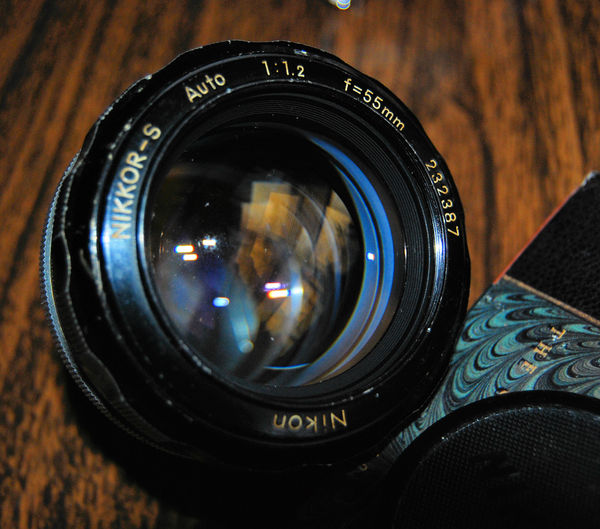What's a 'fast' lens.
Feb 17, 2012 19:32:23 #
This is my second question of the day. The first was was about smiley faces...this one is actually about photography. Here goes...When researching lenses, I find that they may be referred to as 'fast'. Usually, with F 1.8 or 1.4. Does fast mean lower F stop = faster shutter speeds, or does it mean these lenses can auto focus faster? ..or something else? Thanks.
Feb 17, 2012 19:34:24 #
Wabbit
Loc: Arizona Desert
coondog wrote:
This is my second question of the day. The first was was about smiley faces...this one is actually about photography. Here goes...When researching lenses, I find that they may be referred to as 'fast'. Usually, with F 1.8 or 1.4. Does fast mean lower F stop = faster shutter speeds, or does it mean these lenses can auto focus faster? ..or something else? Thanks.
Your first answer is correct
lower F stop = faster shutter speeds
Feb 17, 2012 19:35:02 #
naturalite
Loc: Up state NY
It has to do with the amount of light it lets in. More glass bigger opening. Better for low light photos.
Feb 17, 2012 19:41:50 #
A low fstop number means it is letting more light in that results in quicker shutter speeds.
Feb 17, 2012 20:04:27 #
ring wrote:
lower F stop = faster shutter speeds
Actually, the speed of shutter curtains never change. The duration of time (that the shutter is open) changes. Proper term should be shutter duration.coondog wrote:
Your first answer is correctThis is my second question of the day. The first was was about smiley faces...this one is actually about photography. Here goes...When researching lenses, I find that they may be referred to as 'fast'. Usually, with F 1.8 or 1.4. Does fast mean lower F stop = faster shutter speeds, or does it mean these lenses can auto focus faster? ..or something else? Thanks.
lower F stop = faster shutter speeds
This is why Canon cameras have Tv (Time variation) mode instead of S (Shutter speed) mode.
Wider aperture allows shorter shutter duration.
Feb 17, 2012 23:23:31 #
I hate the term, "Amount of light". It could also mean the amount of time the image is exposed. In my classes I tell them aperture controls "intensity of light", shutter controls "amount of time".
Feb 18, 2012 06:44:26 #
CC-EBBETS
Loc: abit west of the Atlantic
Good question. It is nice to have so many knowledgable people handy to answer questions such as this. So if I may extend this thread just a little longer, I have a related question. I was told that "fast lenses" (f/1.2, f/1.4) are not always good in that they were more difficult to focus and obtain a workable DOF, especially when using a fast Zoom. I don't understand this, especially considering that "fast" zooms generally cost two or three times as much.
Feb 18, 2012 06:53:54 #
Roger Hicks
Loc: Aquitaine
Fast zooms are harder to design and more expensive to build than fast primes, simply because they are more complicated: that's all there is to it.
Fast lenses are no harder to focus than any other lens, but they do need to be focused accurately, because depth of field will not cover up focusing errors.
Personally, I find little use for VERY fast lenses (faster than f/1.4), simply because of the very shallow depth of field, but if you go to http://www.rogerandfrances.com/subscription/ps%20king.html on my site you'll find pictures taken at f/1.2 and f/1.
Cheers,
R.
Fast lenses are no harder to focus than any other lens, but they do need to be focused accurately, because depth of field will not cover up focusing errors.
Personally, I find little use for VERY fast lenses (faster than f/1.4), simply because of the very shallow depth of field, but if you go to http://www.rogerandfrances.com/subscription/ps%20king.html on my site you'll find pictures taken at f/1.2 and f/1.
Cheers,
R.
Feb 18, 2012 08:22:33 #
Every response here is correct (which may be a record of some sort for UHH..) To simply add a bit, the reason that some photographers like or need 'fast' lenses is that they allow you to capture a scene where the light is less than optimal and a flash is not an answer. For example, indoor sports, concerts, night photography, etc. With a fast lens, you can use a faster shutter (duration) to capture action. Outside in broad daylight, in most circumstances, they aren't as necessary.
Feb 18, 2012 08:36:45 #
Roger Hicks
Loc: Aquitaine
JimH wrote:
Outside in broad daylight, in most circumstances, they aren't as necessary.
Absolutely true, though now that we are dotting the i's and crossing the t's, it may be worth adding that there is a fashion (for which I do not care) for shooting very fast lenses wide open with extremely high shutter speeds and/or neutral density filters. If the OP would care to Google 'bokeh', I'm sure he'll find numerous examples.
From http://www.rogerandfrances.com/subscription/bokeh.html on my site:
For some photographers, the problem soon arose that the bokeh tail soon started to wag the photographic dog. They became so obsessed with bokeh that they started composing pictures where the out-of-focus areas were more important than (or at least, as important as) the sharp areas. This sort of composition is possible, but it is also extremely difficult: not one in a hundred photographers can do it well. The bokeh addicts started buying extreme-speed lenses, and using them wide open, because that was the easiest way to get the most bokeh. This meant ultra-high shutter speeds, or neutral density filters, or both. It also meant a lot of very unsuccessful pictures.
Cheers,
R.
Feb 18, 2012 09:05:11 #
coondog wrote:
This is my second question of the day. The first was was about smiley faces...this one is actually about photography. Here goes...When researching lenses, I find that they may be referred to as 'fast'. Usually, with F 1.8 or 1.4. Does fast mean lower F stop = faster shutter speeds, or does it mean these lenses can auto focus faster? ..or something else? Thanks.
Specifically refers to the lens's ability to gather light at faster shutter speeds without a flash. I have an old Nikon 50mm with a maximum aperture of f/1.2. It was a great tool when I worked for the local paper. I could take pics in a room where flash was prohibited and still come back to the newsroom with the 'shot'! I am not sure anything that 'fast' is being made these days. A good quality lens with an aperture that large is very expensive to make.
Pic attached
Nikon f/1.2 lens

Feb 18, 2012 09:10:37 #
Roger Hicks
Loc: Aquitaine
[quote=nikon_jon]
In Leica M-mount there's a 50/0.95 Noctilux from Leica and a 50/1.1 from Voigtländer. I believe there are still 50/1.2 lenses in reflex mounts too, from Nikon and Canon, but the Canon 50/1 was dropped in (I believe) 2000.
Cheers,
R.
coondog wrote:
. . . . I am not sure anything that 'fast' is being made these days . . .
In Leica M-mount there's a 50/0.95 Noctilux from Leica and a 50/1.1 from Voigtländer. I believe there are still 50/1.2 lenses in reflex mounts too, from Nikon and Canon, but the Canon 50/1 was dropped in (I believe) 2000.
Cheers,
R.
Feb 18, 2012 10:50:11 #
The term "Fast glass" also means the speed at which money leaves your pockets :)
Feb 18, 2012 10:54:48 #
buddyro48 wrote:
The term "Fast glass" also means the speed at which money leaves your pockets :)
LOL!! Good one and it's true.
Feb 18, 2012 17:54:08 #
Actually fast lens is a relitive term.
It's actually called "fast" because in the olden days the "leaves" had to travel faster in order to get from the widest starting point to the narrowest point.
*(Confused yet?)
At the same shutter speed the "leaves" have to travel at a certian speed to get from f:2.0 to f:32 on a lens At the same speed the "leaves" must travel FASTER if they start at f:1.4 and travel to f:32 on the same mm size lens.
It also takes allot more presision to go faster and that did cost more, (back in the days at least).
Now that the "leaves" are pretty good and their speed is pretty quick anyways, the term FAST is just a carry-on from the olden days.
It's actually called "fast" because in the olden days the "leaves" had to travel faster in order to get from the widest starting point to the narrowest point.
*(Confused yet?)
At the same shutter speed the "leaves" have to travel at a certian speed to get from f:2.0 to f:32 on a lens At the same speed the "leaves" must travel FASTER if they start at f:1.4 and travel to f:32 on the same mm size lens.
It also takes allot more presision to go faster and that did cost more, (back in the days at least).
Now that the "leaves" are pretty good and their speed is pretty quick anyways, the term FAST is just a carry-on from the olden days.
If you want to reply, then register here. Registration is free and your account is created instantly, so you can post right away.







